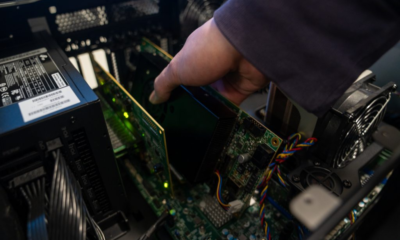Tech News
Pentagon cuts science and technology funding request – Federal News Network

Hubbard Radio Washington DC, LLC. All rights reserved. This website is not intended for users located within the European Economic Area.
Artificial intelligence, space technology projects and integrated sensing and cyber efforts make up the majority of the Pentagon’s S&T budget request.
The Defense Department is seeking $17.2 billion to fund its science and technology initiatives in 2025, a 3.4% decrease from last year’s request.
Last year, the department requested $17.8 billion — its largest-ever ask for science and technology initiatives.
Undersecretary of Defense for Research and Engineering Heidi Shyu said it is due to the department’s shifting priorities from basic and applied research to expediting technology transition from the laboratory into operational use.
“That is primarily driven by the fact that a lot more of the requests in terms of priorities went into the 6.4 bin as opposed to 6.1, 6.2 and 6.3,” Shyu said during the National Defense Industrial Association event.
Join us May 8 at 2 p.m. ET where government and industry leaders will discuss pain points, current trends and strategies for the future of human capital management. | CPE eligible
The 2025 S&T budget request is 2% of the total budget request at just under $850 billion, a 0.1% drop from the previous year. That total is only 1% more than the department requested in 2024, which aligns with the Fiscal Responsibility Act passed by Congress in 2023.
Almost half of the $17.2 billion request for S&T projects would fund Shyu’s office, the Defense Innovation Unit, the Defense Advanced Research Projects Agency, the DoD’s Strategic Capabilities Office, the Missile Defense Agency and the Test Resource Management Center.
Additionally, 16% of the total S&T funding would go toward projects within the Army, another 16% would fund initiatives within the Air Force, 15% of the budget would fund S&T projects within the Navy and 5% is allocated for the Space Force.
Almost half of the funding would go toward the development of advanced technologies budget activity. Only 14% is set aside for basic research and 34% for applied research.
Funding for basic research across the department would remain at $2.5 billion while funding for applied research would drop from $6 billion in 2024 to $5.8 billion in fiscal 2025.
Almost $5 billion of the total funding would go toward trusted artificial intelligence and autonomy efforts. Last year, the department requested $629 million for its AI projects.
“That’s not going to be surprising,” said Shyu.
A large portion of the request is allocated to space technology projects and integrated sensing and cyber efforts.
Read more: Defense
Those three categories of funding make up almost 65% of the S&T budget. At the same time, the department is asking Congress for $752 million for its four emerging technology areas, including $414 million for advanced materials, $224 million for biotechnology, $38 million for future-generation wireless technology and $76 million for quantum sciences.
In 2023, the department allocated about $2.6 billion to the Small Business Innovation Research and Small Business Technology Transfer programs. Unsurprisingly, most of this funding went toward artificial intelligence, sensing and cyber projects and space technologies.
Shyu also said there has been a 33% increase in the number of small businesses participating in the SBIR and STTR programs that have transitioned their technologies to SBIR and STTR Phase III, or commercialization phase, since 2021.
“This is where we are focusing on transitioning more of the technologies that we’re developing from with small businesses as well as universities to push it over into the services. The 33% increase in SBIR/STTR transition into Phase III since 2021 shows an increase of $954 million in fiscal 23 — that’s a really good story,” Shyu said.
There has also been a 53% increase of new vendors participating in SBIR and STTR programs since 2021, Shyu added.
Copyright © 2024 Federal News Network. All rights reserved. This website is not intended for users located within the European Economic Area.
Each week, Defense Reporter Jared Serbu speaks with the managers of the federal government’s largest department. Subscribe on PodcastOne or Apple Podcasts.
Need help accessing the FCC Public File due to a disability? Please contact Susan Rushkowski at [email protected] or (202) 895-5027.
Copyright 2024 Hubbard Radio Washington DC, LLC. All rights reserved. This website is not intended for users located within the European Economic Area.
Tech News
Mechanical Engineering Outstanding Senior 2024: Spencer Macturk – Virginia Tech

Alex Parrish
view all
view all
view all
view all
view all
Virginia Tech demonstrates impact as a global land grant – progressing sustainability in our community, through the Commonwealth of Virginia, and around the world.
Get Directions
See All Locations
Contact Virginia Tech
For the media
© 2024 Virginia Polytechnic Institute and State University. All rights reserved.
Tech News
Biden administration taps tech CEOs for AI safety, security board – NBC News

Profile
Sections
tv
Featured
More From NBC
Follow NBC News
There are no new alerts at this time
The Department of Homeland Security established an advisory panel Friday to study how to protect critical infrastructure including power grids and airports from threats related to artificial intelligence.
The Artificial Intelligence Safety and Security Board, which has 22 initial members, includes high-profile figures in tech like OpenAI CEO Sam Altman, Microsoft CEO and chairman Satya Nadella and Alphabet CEO Sundar Pichai, according to a statement from the DHS.
President Joe Biden ordered the creation of the board in October when he signed a wide-ranging executive order on AI, representing the federal government’s first foray into trying to regulate the technology since advanced AI apps including OpenAI’s ChatGPT went viral in popularity.
The board’s mission includes developing recommendations “to prevent and prepare for AI-related disruptions to critical services that impact national or economic security, public health, or safety.”
AI experts have identified a wide array of potential security threats that the new technology could make possible, from swarms of autonomous drones to cheap and lethal bioweapons to more effective hacking threats against critical computer systems.
The government’s defense may involve using AI to fight AI, the DHS said.
“The Board will develop recommendations to help critical infrastructure stakeholders, such as transportation service providers, pipeline and power grid operators, and internet service providers, more responsibly leverage AI technologies,” the department said.
Homeland Security Secretary Alejandro Mayorkas said in a statement that AI “can advance our national interests in unprecedented ways” but that it also “presents real risks — risks that we can mitigate by adopting best practices and taking other studied, concrete actions.”
In addition to tech CEOs, the board includes the CEOs of Delta Air Lines, defense contractor Northrop Grumman and oil producer Occidental Petroleum, as well as Maryland’s Democratic Gov. Wes Moore, Seattle Mayor Bruce Harrell and the leaders of two civil rights organizations.
David Ingram covers tech for NBC News.
© 2024 NBC UNIVERSAL
Tech News
What is AI, how does it work and what can it be used for? – BBC.com
-

 General Knowledge2 years ago
General Knowledge2 years agoList of Indian States and Capital
-

 General Knowledge2 years ago
General Knowledge2 years agoList Of 400 Famous Books and Authors
-

 Important Days4 years ago
Important Days4 years agoImportant Days of Each Month
-

 General Knowledge2 years ago
General Knowledge2 years agoCountries and their National Sports
-

 General Knowledge3 years ago
General Knowledge3 years agoCountry Capital and Currency
-

 Important Days3 years ago
Important Days3 years agoHoli
-

 General Knowledge2 years ago
General Knowledge2 years agoList of Indian President
-

 General Knowledge2 years ago
General Knowledge2 years agoList of Indian Vice President















